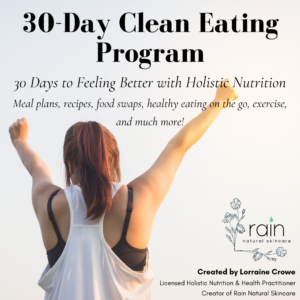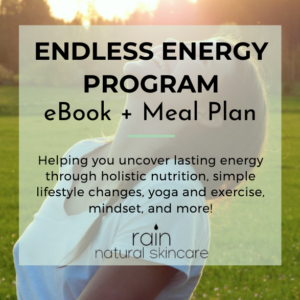Last week I talked about my struggles with my health and my acne, and I told you I was going to give you a Holistic Nutrition 101 crash course, discuss how I changed my diet and what diet I went on….(hint-none).
OK, grab a glass of water or cup of tea and give yourself a few minutes to be able to sit and read this.
Many people are confused about what is a good diet, what should I eat, and which is the healthiest. There are so many kinds out there…low carb, high carb, low fat, Paleo, Keto, Vegetarian, Vegan, etc. The list goes on. So, which is the healthiest?
Here’s my opinion… No one diet is the healthiest. First of all, anything that you call a DIET is unhealthy, because you are restricted from certain food groups. You want to eat the food that makes YOU feel your best, not what works for your best friend, your co-worker, or the latest celebrity. Eat the foods that are going to make you happy, have better digestion, and allow your skin to glow and your hair and nails to be strong. Your dietary choices are up to you, you need to find what works for you and makes you thrive in your life.
The key to good health and longevity is simple: eat a wholesome diet.
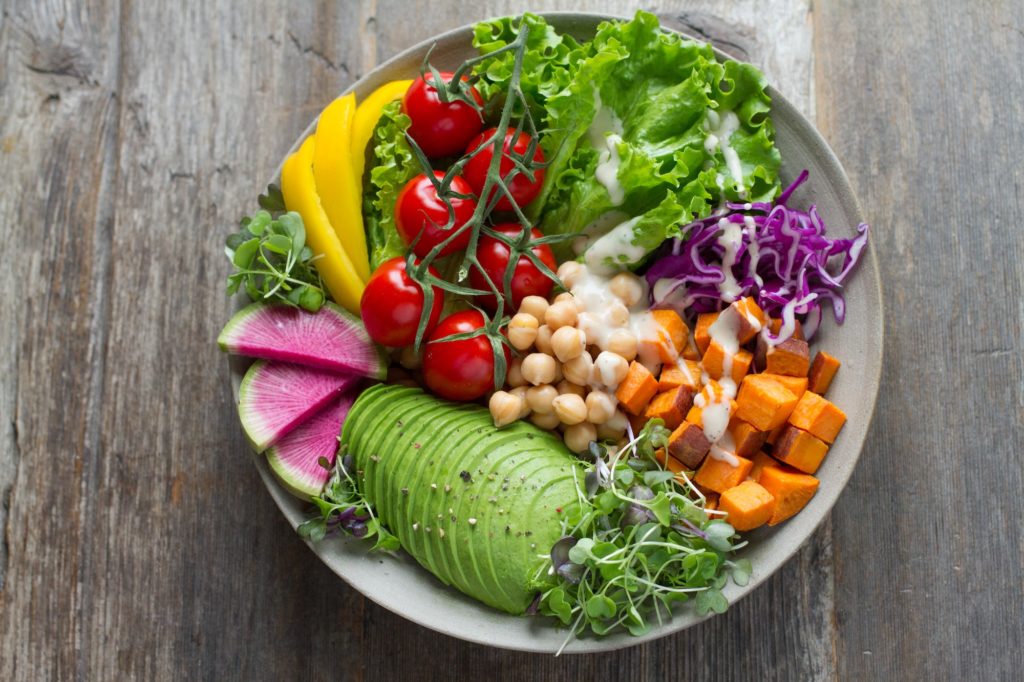
What is a wholesome diet?
It’s comprised of real whole foods with plenty of water, fresh vegetables, fruits, lean proteins, healthy fats, raw nuts, seeds, beans and whole grains. You can’t go wrong when you are eating as close to nature as possible while avoiding processed foods, additives, and hydrogenated and saturated fats. Whole foods contain just one ingredient.
Real whole foods are grown or raised with few or no chemicals, hormones, sprays or extra processing, just like the food you would grow in your own garden. It should be something that your great-grandparents would recognize and were raised on. Real food has nothing added to it, or nothing taken away from all the processing. It comes from either plants or animals and has not passed through a chemistry lab before you consume it. Any processing should happen in your own kitchen.
“If it came from a plant, eat it; if it was made in a plant, don’t.”
– Michael Pollan
Think about food and what you eat as a way to create a healthy lifestyle. By doing so the results will include: improved digestion, increased energy, better sleep, glowing skin and shiny hair, balanced hormones, lowered blood pressure and cholesterol, weight balance, and feeling amazing every day.
It’s about focusing on becoming healthy from the inside out. On changing your diet by adding, not deleting!! Healthy living means healing your mind and your body.
Try to start this transformation in the kitchen. The quickest and most effective way to change your health for the better is to cook your own food!
The idea is to eat the most nutrient-dense foods.
Did you know you could eat 3,000 calories a day, and still be starving on a nutritional basis? Manmade foods trick your body into thinking it’s getting the nutrients it needs when it’s not, which is why it stays hungry for them, (like a Big Mac Meal that has 1200 calories and not many nutrients). We need certain vitamins and minerals for our body to function properly, often we are starved of these nutrients, and therefore we keep eating empty calories and pack on weight. Then with the added weight comes the pollutants that are in those foods. We start to develop diseases like diabetes, heart disease and cancer. People end up being overfed but are also starving nutritionally.
We’re not eating food, but food-like products that are made to look and taste good, and also last a long time. Food is information, not just a source of energy or calories; it controls everything. Food affects our moods, hormones, brain chemistry, our skin, and our immune system.
Some simple rules for getting started:
- No more diet mentality. A particular food may be one person’s medicine while being another’s poison. You are your own best nutritionist. Start to notice how you feel after eating. Feeling good is not just about what you eat, but about what you do as well, like your lifestyle choices. Do what works for you.
- Listen to your body – it knows what it needs. It’s always giving you signals and clues; you just need to know how to listen. Trust yourself to know when to eat when hungry, sleep when you are tired, and rest when you need to. Move your body with exercise to energize it. Enjoy healthy relationships in your life, and most of all think and choose thoughts that are healthy for your whole body.
Think of living your life to prevent diseases from occurring, rather than trying to deal with them once they happen. Everything you eat, and every thought you have can increase your health or increase disease. You are responsible for your own health, you want to make the choices to be healthy before your body becomes ill and you have to work twice as hard to bring it back to a healthy balance. Our bodies are very smart and give us clues all the time, it’s whether we listen to or ignore them. For example, if you get the flu or colds all the time, are always feeling tired, stressed or anxious, have low energy, digestive issues, skin issues or feelings of unhappiness.
This is your body telling you something is not right, and if you continue to ignore it, you may become ill.
The medicine that you need to keep you healthy is the food you eat, how you treat your body, and how you spend your time. When you take care of your body, you will have a healthy and happy place to live for years to come. Think of every bite you eat as the energy that is our body’s fuel. We need food and its nutrients to maintain life and promote cell and tissue growth. When you eat foods like vegetables, fruits, healthy fats and high-quality proteins, you will feel amazing, and this feeling will be reflected outwardly.
You want to ensure that you are getting the highest levels of essential nutrients needed for excellent health, including vitamins, minerals, phytonutrients, essential fatty acids and fibre.
Simply put, a nutrient is a substance that provides nourishment essential for growth and the maintenance of health.
There are SIX classes of nutrients:
- protein
- carbohydrates
- fat
- water
- vitamins
- minerals
Proteins, carbohydrates and fats provide energy and are referred to as energy-yielding nutrients.
The energy-yielding nutrients are considered macronutrients because they are required in relatively large amounts in the body. Water is included as a macronutrient, but it does not provide energy. Vitamins and minerals also do not provide energy and are considered micronutrients because they are only needed in small amounts by the body.
Together macro and micronutrients provide energy, structure, and regulation which are needed for growth, maintenance, repair, and reproduction. A balance of all nutrients is needed to maintain good health.
The number of essential nutrients needed each day varies based on many different things such as your age, sex, body size, genetic traits, illness, pregnancy, breastfeeding, medication use, and exposure to environmental contaminants. In general, your diet should consist of 45-65% carbs, 10-35% protein & 20-35% fat.
When talking about obtaining macronutrients in the diet we must be able to recognize the difference in the quality of the food as processed, versus natural whole foods, which will impact the body differently and provide different nutrition. Try to avoid processed and refined foods including refined sugar, white flour products, excessive canned foods, toxic additives, and refined table salt; try to include organic foods to eliminate foods that are heavily sprayed with herbicides and pesticides. Hydrogenated fats, refined vegetable oils, and commercial animal products that have been fed hormones and antibiotics should be avoided as well.
Instead, we want to be sourcing free-range organic eggs, organic or locally grown fruits and vegetables, grass-fed beef, free-range poultry, deep seawater fish, cold-pressed unrefined oils, butter, unrefined sea salt and whole grains, beans, legumes, raw nuts, and seeds. Eating a wide variety of foods that are local and in season will help to ensure that the body is receiving all the nutrients it needs. (Shop at your local farmer’s markets!)
Achieving optimal health through nutrition begins with eating a properly prepared nutrient-dense whole food diet and is the true foundation that leads to optimal health. It is the food choices that we make that impact our well-being and taking steps to replace processed and refined foods in the diet with whole natural foods found in nature is the key to obtaining more nutrition through the diet. It is not a coincidence that health issues such as type 2 diabetes, high blood pressure, heart disease, and cancer are rising with the consumption of processed and refined foods that are nutrient-deficient and taking the place of high-quality nutrient-dense whole foods that should be in our diets.
As I was learning all of this while taking my course, I asked for a NutraBullet for Christmas. This is when things started to change how I felt, it was an amazing way to get many nutrients into my body first thing in the morning with a green smoothie.
Here are some of the changes I made to my daily meals from before:
- I took out the processed cereal and added in a green smoothie or steel-cut oats with fresh fruit, nuts and seeds.
- I replaced my lunch sandwich with a healthy salad and made my own dressing.
- My snacks became whole veggies & hummus, fruits, nuts/seeds, Greek plain or plant-based yoghurt
- My meals were clean whole foods, which I planned ahead of time so I wouldn’t be coming home and wondering what to make.
- I cut out the coffee and added in more water and herbal teas.
I added more whole foods that have natural healthy fats that are so needed by our bodies. Our fat-soluble vitamins are dependent on them, and so are our hormones and our brains. These healthy fats also help us to feel fuller and unlike sugar which gives us a sugar high and then crashes an hour later, and before you know it, we’re looking for our next fix to give us that energy we so desperately need.
Cutting out the processed sugar made a HUGE difference in my energy, my skin, and my digestion.
Here is a quick example, the yoghurt on the top looks good, but you see it has 26 grams of sugar. Now in case you didn’t know, every 4 grams of sugar equals 1 tsp of sugar. That serving of yoghurt has 4.5 tsp of added sugar. The second option is plain Greek yoghurt which has only 6 grams of sugar per serving, so 1.5 tsp sugar naturally occurring from the milk. See how sneaky labels can be. (I will talk about reading nutrition labels further in my series.)
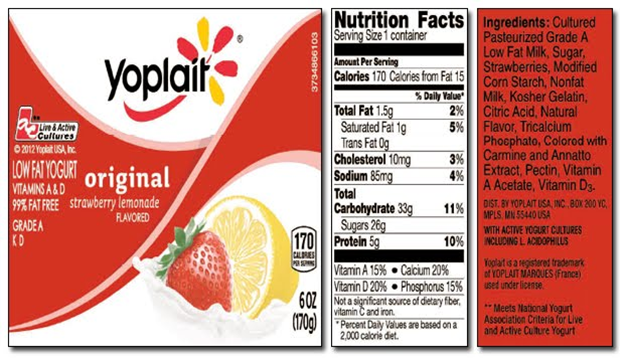
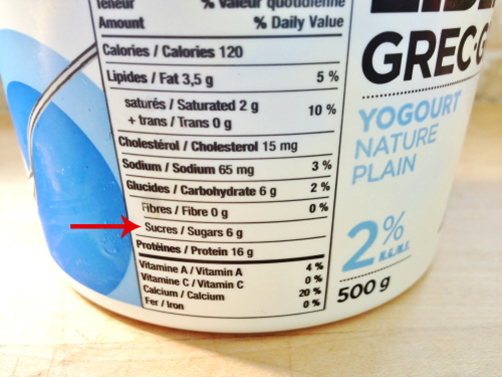
If you want healthy skin, you need to have a healthy body. Remember disease develops over time, sometimes over many years, and then it may get diagnosed. It could be diabetes, high blood pressure, heart disease, or maybe cystic acne, rosacea, eczema, or psoriasis. To prevent disease or skin issues of all kinds, think about your diet, this is where it starts. Our body is made to heal, when we eliminate the source of our health issues, like processed foods, and toxic ingredients in our food and skincare products, then our bodies will thank us!
What you do today affects your tomorrow, a year from now, 10 years from now, and so on…
Next week I’ll discuss clean eating vs calorie counting. Do you calorie count? Here is part 3.
Here’s a favourite snack of mine. It’s a simple, whole-food, and nutrient-dense snack you can make in mere seconds, and your kids will love it too!
Banana Sushi
- 1 Banana
- 1Tbsp almond, nut butter or peanut butter
- 1 tsp hemp seeds, sunflower seeds, chopped nuts, flaked coconut or cacao nibs
Peel the banana spread nut butter on it and sprinkle with the seeds or nuts.
Slice into coin bite-size pieces and enjoy.
